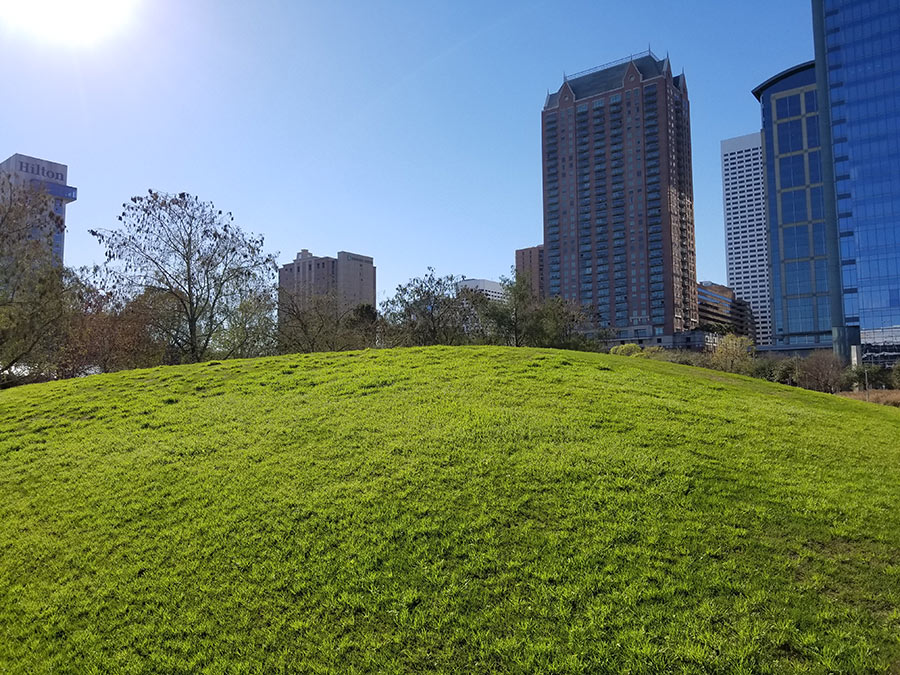
- How ExxonMobil’s New Corporate Campus is Altering the Houston’s Northern Suburbs [Houston Chronicle ($)]
- First Occupants of New ExxonMobil Campus Due in March [Houston Chronicle ($)]
- Texas Children’s Hospital Breaks Ground on Woodlands Campus [Houston Business Journal]
- Banker Predicts Greater Heights Housing Market Will Keep Up Pace for 2 to 3 More Years [The Leader]
- St. Thomas To Launch Website on Plans for ‘North Campus’ at Former HISD Law Enforcement HS [The Leader; previously on Swamplot]
- Fort Bend May Be Most Ethnically Diverse County in the World, Says Rice’s Stephen Klineberg [Your Houston News]
- With Commercialization of Space Travel, Houston Has Lost Its Head Start as ‘Space City‘ [Houston Chronicle ($)]
Photo of downtown mural: elnina via Swamplot Flickr Pool
Headlines





You won’t get a full picture of diversity, unless you look at economic diversity in addition to racial and ethnic diversity. And this is where Fort Bend County lags behind. It is very racially and ethnically diverse, and they deserve accolades for that, but it is far less economically diverse than Harris County.
@ZAW So what?
ZAW, I appreciate that you’re generally the moderate voice on Swamplot, but you’ve just given a confusing and seemingly paradoxical definition of progress, although it does rather neatly express the moving target that is the answer to the question, “What does the left really want?”
Isn’t economic diversity a bad thing according the liberal mindset? I thought everyone is supposed to be economically homogeneous regardless of intelligence and effort?
ZAW: The question is, does Fort Bend help minorities get rich, or do rich minorities concentrate in Fort Bend? I suspect there’s more to the former than you’re assuming.
Luciaphile: what I was getting at is that younger generations are increasingly blind to race. But we’re more divided by economics and education than our parents and grandparents were. It doesn’t matter if our neighbors are Asian, Black, Latino, Middle Eastern, or whatever – so long as they have roughly the same education level as we do, and make about as much money as we do.
.
I’m not saying I like it. I’m just saying it’s what I’ve observed. And it seems to be very pronounced in Fort Bend County.
i think ZAW’s point is that diversity has been primarily studied as a sign of progress in social areas. however, most of these factors associated with race in the past have now been decoupled from race and are purely economic status issues. in the sense of greater acceptance of racial divesity improving living standards for all, we’ve improved. in the sense that this greater acceptance of diversity has improved standards of iving for and the ability of low-income residents to reside in varying parts of town not just strictly low-income, we’re still failing.
so basically we’re a diverse city, but our niehgborhoods are still very much economically homogenous. not good perhaps, but i don’t see any reason to expect anything different in a city dominated by single-family homes.
Thanks for clearing that up, ZAW and joel.
So the utopian liberal society has rich, poor, and everyone in between of all colors mixed in all neighborhoods, and all the poor people don’t lack anything they need. Does everyone ride bikes too or do we want a mix of walkers, car drivers, and bus riders?
@ Joel: exactly.
In any area dominated by a single family market whose values and desirability are driven by the perceived quality of the public schools – like much of Fort Bend County – the actions of individual homebuyers, who usually seek to cluster themselves so as to form a homogeneous school zone demographic, will largely define the household income landscape of the area. If it starts to diversify enough so that lower income households contribute above some percentage of the school population – above maybe 20-25%?, just a guess – the higher income households move away over time, converting the area to a tighter income spectrum on the lower end. It can work in the opposite fashion, driving out lower or moderate income households, if the public schools are perceived to be increasingly good quality, especially if the area is located closer to the urban core of Houston or in the Memorial corridor. Point is, wide-spectrum economic diversity in suburban areas tend to be fleeting.
But when you compare Montgomery County’s 72% white to the almost complete racial/ethnic plurality of Fort Bend, you have to admit that Fort Bend does offer an unusual suburban experience in terms of diversity.
So the complaint is that petroleum engineers don’t live next to landscapers?
I do not come bearing quantitative facts, but Fort Bend County is in fact highly economically diverse. Anyone who has lived there can confirm. The Willowridge area (W. Fuqua, S. Post Oak) is largely African American, and ranges from poor to solidly middle class suburban. Missouri City is very mixed in ethnicity as well as income; drive down 5th Street some day (many fear to do so) and you’ll see affordable new housing interspersed with trailer parks and decaying shacks. Sugar Land is largely wealthy or upper middle class, but the Settler’s Way area is full of older, smaller homes that are affordable. Parts of Fort Bend are actually City of Houston, such as some of Mission Bend, which is far from a wealthy area. A lot of the population in FB is in Richmond/Rosenberg, largely Hispanic, and ranging from old-money estates to middle class burbs to near colonia type conditions (see northern Richmond). Then you get out in the country southwest of there, and there are a lot of agricultural/rural African American and Hispanic communities.
TL/DR: It’s diverse in Fort Bend. By race, and by economics.
Please cut out the links to the Chronicle that require a subscription to access, it’s annoying.
I really wonder how Affirmative Action folds into all this grand “diversity”. As I white male having matriculated at UT-Austin in the 90’s, I win witnessed more than a few upper middle class African Ameeicans get into prestigious grad programs when I was aware of their mediocre grades and overall poor academic performance, it was infuriating to sit next to someone you know is making C’s yet has just somehow gotten into SMU Law School….I have no issue with diversity, but let’s make a level playing field–and frankly the burbs in Houston are more diverse than most cities I’ve visited —
What a thankless task to be a social engineer: half an inch off on the quality of the schools, and you’ve got wretched affluence; half an inch the other way, Bright Flight. Where the situation is really dire you might need to withhold some disaster relief to calibrate things, or force a county to sue its municipalities, those places where zoning has held things constant a beat too long:
http://news.investors.com/123013-684627-hud-proposal-called-fair-housing-overreach.htm?ref=HPLNews
Yet how to ensure that this perfect moment in Fort Bend’s history remains the status quo forever, when we all know nothing gold can stay, Ponyboy; what with people having such troublingly divergent attitudes towards reproduction? “Cuz the one place you know you are not supposed to be is in people’s bedrooms.
And you must do all this without threatening any one subculture, because where they conflict, subculture trumps homogeneity (and race trumps gender, and rock scissors).
Well – except one subculture: we can all agree that the aristocracy has to go. Right after three more seasons of Downton Abbey!
Woah there, Luciaphile. You’re calling me confusing?
.
I’m not advocating for social engineering. As the housing stock ages, Fort Bend County will naturally become more economically diverse. (Aside: I was driving back from the outer reaches of Sugar Land and was shocked to see a line of big, new, suburban two story houses, with balconies backing up to the highway! No sound barrier. No screening trees. Just houses, with master-suite balconies that look at I-69. Does anyone really think these are going to keep their value?)
.
The real test of Fort Bend County, will be when they have become as economically diverse as Harris County. If the schools are still as good; if the crime is still as low – then they’ll deserve the accolades. This is what I’m getting at.
ZAW, I may share your disdain; but the idea that Fort Bend County, Texas is problematic because its combination of model homes and model UN and model-enough schools in some remote sense make it an enclave of the blithe privileged – and that there will be fewer such places (actual such places, I mean) in America in the future, when it more resembles the rest of the world: I’ll speak plainly, I find it breathtakingly naive.
But pleasing, too, in its hopefulness, so I happily yield.